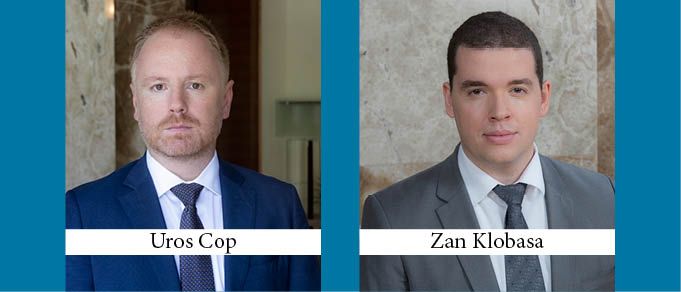As in almost all other jurisdictions, in Slovenia there are no cryptocurrency-specific tax laws. In order to shed light on the tax treatment of the cryptocurrency in Slovenia, in June 2018 the Financial Administration of the Republic of Slovenia (FURS) issued the extended and updated Guidelines on Tax Treatment of Cryptocurrencies in Slovenia (the “Guidelines”).
Slovenia’s tax treatment of private individuals is regulated by the Personal Income Tax Act (ZDoh-2). According to the Guidelines, individuals are taxed significantly differently by FURS depending on whether they obtained income within or outside the scope of their business activities.
If an individual obtains income from trading or mining of cryptocurrencies in the scope of permanent, independent, and individual business activity, the income is considered “personal business income” under ZDoh-2. The tax base is determined as the difference between revenue and costs and is subject to progressive tax rate of up to 50%. Under certain conditions, personal business income may be determined on the basis of lump-sum costs accounting for 80% of the income and subject to a 20% tax rate.
Capital gains obtained by disposing movable property outside of the permanent business activity are exempt from taxation under Article 32 of ZDoh-2. As FURS considers cryptocurrencies to be movable property, any gains obtained by trading cryptocurrencies are free from taxation, provided that they were obtained outside the scope of permanent business activity.
Mining and similar confirming of cryptocurrency transactions is considered “other income” under Article 105 of ZDoh-2, provided that the income was obtained outside the scope of permanent business activity. The tax base is the entire value of cryptocurrencies obtained by mining, calculated according to the price at the time of acquiring. Costs incurred by mining are not deducted from the tax base. The resulting gain is subject to a progressive tax rate of up to 50% and an advance flat tax rate of 25% for residents.
Gratuitous obtaining of cryptographic tokens by individuals from the issuer during an initial coin offering is subject to different types of tax regimes depending on the nature of the transaction. If tokens are gratuitously distributed to a holder of more than 25% of the business share in the issuer, the flat tax rate is 25%. If tokens are received in relation to employment or other contractual relationship for performing services, the income is subject to a progressive tax rate of up to 50% and an advance flat tax rate of 25% for residents. Social contributions must also be paid. All other cases are subject to a progressive tax rate of up to 50% and an advance flat tax rate of 25% for residents under Article 105 of ZDoh-2. The tax base is calculated according to either the white paper price or the market price, depending on whether the token is already publicly traded.
The tax base for corporate tax is the surplus of revenue over expenses as laid down by the Corporate Income Tax Act (ZDDPO-2). Therefore, all cryptocurrency-related activities which create revenue for a company are subject to corporate tax if a surplus over recognized expenses exists. The corporate income tax rate is 19%.
The service of exchanging fiat currencies into cryptocurrencies and vice-versa is exempt from the value-added tax (VAT) under Article 44(4d) of the Value-Added Tax Act (ZDDV-1). Provision of electronic wallet services is considered a close relation to the exchange of cryptocurrencies and is therefore also subject to this exemption. On the other hand, providing services in connection to peer-to-peer trading, such as online platforms for combining buyers and sellers, is subject to VAT at a 22% rate, as it is not sufficiently linked to the exchange itself. If utility cryptographic tokens are used for the payment of services, they are considered means of payment, and such transactions are subject to VAT.
According to FURS, mining of cryptocurrencies is not subject to VAT, as there are no specific customers, the miners are only rewarded on a voluntary basis, and their remuneration is not guaranteed. Accordingly, a company does not have the right to deduct the purchase of mining hardware and software from VAT.
While the current application of tax laws appears quite favorable for individuals trading in their private sphere, it is possible that the regime will be subject to change, as cryptocurrencies are a relative novelty and FURS is actively learning on the subject, whereas standards of international practice will likely impact the future treatment of cryptocurrencies by FURS.
By Uros Cop, Managing Partner, and Zan Klobasa, Legal Clerk, Miro Senica & Attorneys
This Article was originally published in Issue 5.12 of the CEE Legal Matters Magazine. If you would like to receive a hard copy of the magazine, you can subscribe here.
















